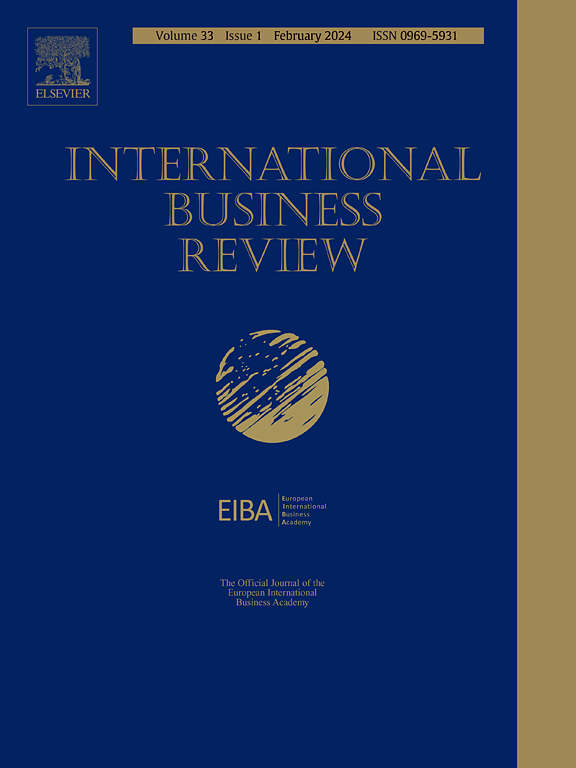Triple-loop springboarding and simulacrum enterprises: Financialization and new forms of emerging economy educational international businesses
IF 6.1
1区 管理学
Q1 BUSINESS
引用次数: 0
Abstract
This paper examines financialization as a motivation for emerging economy non-financial companies to access, localize, and financialize firm-specific assets (FSAs) obtained from developed market economy enterprises (DMEs) through a triple-loop springboarding process. An abductive methodology was employed, combining both deductive and inductive approaches, and involving five intensive case studies derived from 98 semi-structured interviews focused on the internationalization of emerging market multinational enterprises (EMNEs) in the educational sector. This study identified a triple-loop springboarding process underpinning the internationalization of EMNEs. The first loop involves a financialization motivation, with inward internationalization to form an investment vehicle; the second centers on localization to establish a simulacrum in an emerging economy setting; and the third encompasses outward internationalization, incorporating localization and the creation of additional simulacra in both emerging and developed economy locations. Our findings make an important contribution to the IB literature by highlighting the importance of localization within springboarding theory, as well as the intersections between financialization and localization processes with springboarding—processes notably absent in the existing springboard literature.
三环跳板与模拟企业:新兴经济教育国际业务的金融化与新形态
本文考察了金融化作为新兴经济体非金融公司通过三环跳板过程获取、本地化和金融化从发达市场经济企业(DMEs)获得的企业特定资产(fsa)的动机。采用了一种溯因方法,结合了演绎和归纳方法,并涉及从98个半结构化访谈中得出的五个密集案例研究,这些访谈侧重于新兴市场跨国企业(EMNEs)在教育部门的国际化。本研究确定了支撑EMNEs国际化的三循环跳板过程。第一个循环涉及金融化动机,向内国际化以形成投资工具;第二,以本地化为中心,在新兴经济体背景下建立一个模拟平台;第三种是向外国际化,包括在新兴经济体和发达经济体地区进行本地化和创建额外的模拟。我们的研究结果通过强调本地化在跳板理论中的重要性,以及金融化和本地化过程与跳板过程之间的交集,为IB文献做出了重要贡献,而跳板过程在现有的跳板文献中是明显缺失的。
本文章由计算机程序翻译,如有差异,请以英文原文为准。
求助全文
约1分钟内获得全文
求助全文
来源期刊

International Business Review
BUSINESS-
CiteScore
14.10
自引率
6.90%
发文量
95
审稿时长
62 days
期刊介绍:
The International Business Review (IBR) stands as a premier international journal within the realm of international business and proudly serves as the official publication of the European International Business Academy (EIBA). This esteemed journal publishes original and insightful papers addressing the theory and practice of international business, encompassing a broad spectrum of topics such as firms' internationalization strategies, cross-border management of operations, and comparative studies of business environments across different countries. In essence, IBR is dedicated to disseminating research that informs the international operations of firms, whether they are SMEs or large MNEs, and guides the actions of policymakers in both home and host countries. The journal warmly welcomes conceptual papers, empirical studies, and review articles, fostering contributions from various disciplines including strategy, finance, management, marketing, economics, HRM, and organizational studies. IBR embraces methodological diversity, with equal openness to papers utilizing quantitative, qualitative, or mixed-method approaches.
 求助内容:
求助内容: 应助结果提醒方式:
应助结果提醒方式:


